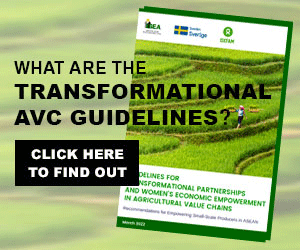Conference Declaration
We are participants of the 2nd Social Enterprise Advocacy and Leveraging Conference in Asia (SEAL-Asia) that was held in Bali, Indonesia from September 27-28, 2017. Coming from 10 different countries, we came together for a learning exchange on social enterprise impacts and the role of the sector in advancing the Sustainable Development Goals (SDGs), with a focus on addressing inequality for a just economy.
Poverty, environmental degradation and inequality between and within nations, between classes and castes, between women and men persist as major problems for the people of Asia. Far from resolving these problems, economic growth in our region has widened inequalities in wealth, resources and power. Our region is also highly vulnerable to climate change and natural disasters, which impact most heavily on the poor and marginalized communities.
We believe that social enterprises transform the lives of poor and marginalized sectors by serving as vehicles for creating and distributing wealth as well as building their assets and capabilities to become actors in their own development. We believe that the sector can play an important role in co-creating social entrepreneurship platforms in collaboration with civil society, government, business and academe to develop innovative pathways towards addressing inequality for a just economy.
We believe that social enterprises and social entrepreneurship platforms are game changers in achieving the SDGs. The sector is already doing its share towards the achievement of zero poverty and hunger; decent jobs and inclusive growth; reduced inequality and women’s economic empowerment; health and education for all; sustainable consumption and production; resilient and sustainable communities; inclusive innovation and industrialization; and partnerships to achieve the goals. But with an enabling policy environment and ecosystem supportive to scaling up the impact of social enterprises, so much more can be achieved to get us nearer these ambitious goals.
We have been enriched by the many tools and experiences for measuring social enterprise impact and tracking the performance of social entrepreneurship initiatives including Development Indexing, Sustainable Livelihood Impact Assessment, the Bamboo Ladder Approach, Social Return on Investment, Business Impact Assessment, implementing a Fair Trade Guarantee System, using People, Planet and Profit as framework for performance evaluation, measuring effectiveness through rapid experimentation in providing solutions to community problems and the use of ICT to track proxy indicators for measuring impact.
We have learned about the importance of setting standards and benchmarks for social enterprises and social entrepreneurship initiatives and ISEA’s pioneering action research based on best practices to develop a set of Benchmarks for Transformational Partnerships and Women’s Economic Empowerment in Agricultural Value Chains in ASEAN and beyond.
We have had a fruitful learning exchange on various social entrepreneurship models that address inequality for a just economy in Indonesia and beyond, including Bina Swadaya’s sustainable model of helping the poor help themselves; Dompet Dhuafa’s model of transforming the poor from mustahik to muzakki and Dian Desa’s empowerment model as embodied in their Muntigunung Community Social Enterprise initiative.
We have learned about the diversity of models and initiatives addressing inequality for a just economy including social enterprises with the poor as primary stakeholders, community enterprises, social businesses, cooperatives, fair trade and social economy organizations. But whatever they are called, the common characteristic of being social-mission driven enterprises that transform the poor and marginalized and that contribute to solving the many dimensions of inequality, poverty, social exclusion and sustainability make all of them a part of the rich tradition of Asia’s evolving social enterprise sector.
Our conference is happening at a time that Bali is confronted with the impending eruption of Mount Agung. The number of evacuees now total more than a hundred thousand and continues to rise. As we express our solidarity to the affected communities, we realize that social enterprises can be an important force in building back better towards resilient and sustainable local economies, in Bali and beyond.
We commit ourselves to build a vibrant social enterprise sector towards just and inclusive economies anchored on equitable and sustainable development. Toward this end, we commit to:
- Collaborate with civil society, government, business, social investors, academe and other actors to enable the rural and urban poor, including farmers, fishers, small producers, indigenous peoples, workers, informal settlers, women, youth, the elderly, persons with disability and other marginalized sectors to become stakeholders in achieving the Sustainable Development Goals;
- Build a broad-based learning community involving various sectors of the larger society to share, replicate and advocate best practices and viable models of social enterprise and social entrepreneurship that have effectively addressed inequality and social exclusion, reduced poverty, built community resilience and advanced sustainable development
- Co-create multi-stakeholder innovation platforms to promote and mainstream the Benchmarks for Transformational Partnerships and Women’s Economic Empowerment in Agricultural Value Chains and other pathways to achieve just and inclusive economies anchored on equitable and sustainable development in ASEAN and beyond;
- Advocate and lobby for dedicated policies and programs to support social enterprises and social entrepreneurship platforms with governments and policy-makers at the sub-national and national levels and in intergovernmental or multilateral bodies such as the ASEAN, APEC, UNESCAP and ADB.
- Engage inclusive businesses, companies practicing corporate social responsibility, social investors and other private sector players to co-create business models, effective financing mechanisms and partnerships that promote social and environmental accountability and build inclusive, ethical and fair markets.
- Promote the culture and practice of measuring impact, developing benchmarks and creating standards for social enterprises and social entrepreneurship platforms, and develop strategies for communicating the sector’s impact and contribution to the achievement of the SDGs.
We are committed to pursue these efforts in our respective networks and countries and to work together in regional initiatives to effectively address inequality for a just economy. We are committed to work in partnership with the Institute for Social Entrepreneurship in Asia and beyond, as pro-active stakeholders towards co-creating a vibrant social enterprise sector offering game changing strategies to make the Sustainable Development Goals a reality in our region.


